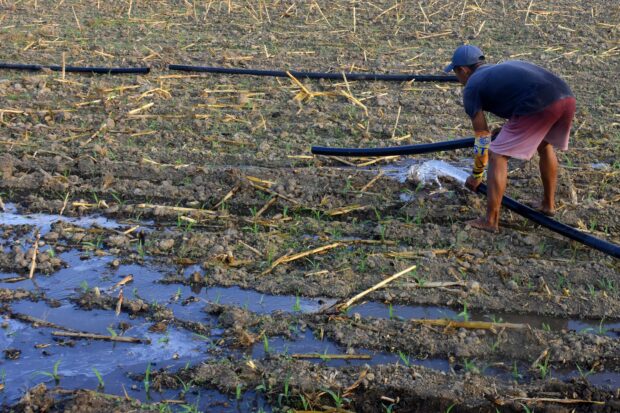Irrigated farms spared by El Niño impact – NIA

PRECIOUS SUPPLY | A farmer ensures that his newly planted cornfield gets a regular water supply in Barangay Leet in Sta. Barbara, Pangasinan. Soil dries quickly due to the intense heat brought about by El Niño. (File photo by WILLIE LOMIBAO / Inquirer Northern Luzon)
MANILA, Philippines — The El Niño weather phenomenon had minimal impact on farmlands irrigated by the National Irrigation Administration (NIA), with only 1 percent of areas expected to be hit by drought or dry spell reported to be actually affected.
According to NIA Administrator Eduardo Guillen, the agency will launch a contract farming scheme covering 40,000 hectares (ha) this month to show that it is possible to continue planting rice as long as there is enough irrigation supply despite El Niño.
In an interview over “Bagong Pilipinas Ngayon” on Wednesday, Guillen noted that 20 percent of irrigated farmlands were expected to be vulnerable to the impact of El Niño.
“But because of our alternate wetting and drying technique, we are able to save up to 20 to 30 percent in irrigation and only a minimal portion of the irrigated areas were actually affected,” Guillen said.
Alternate wetting and drying is a water-saving technology in which irrigation is applied to rice fields after the disappearance of ponded water. This allows farmers to reduce their irrigation water consumption in rice fields without decreasing yield.
Article continues after this advertisementUnder the NIA’s contract farming scheme, a farmer agrees to supply predetermined quantities of an agricultural product while the buyer commits to purchase it and supply farm inputs and technical advice, among others.
Article continues after this advertisement“We received a budget from Congress for contract farming and we will launch it this March for 40,000 ha. We’re saying there’s still El Niño. We want to show that even with El Niño, as long as there is irrigation we can plant palay,” Guillen said.
He made the remarks as the impact of the El Niño phenomenon continued to be felt across the country, with provinces experiencing drought, dry spell or dry condition due to the prolonged absence of rainfall. The state weather bureau earlier warned that El Niño may last up to May this year.
But irrigation for farmlands, the NIA said, is sufficient.
“We also have long-term projects like reservoir-type dams. Solar-powered water pumps are completed within three months, so every month we are able to turn over irrigation projects,” Guillen said.
He added that the NIA was closely working with local governments to assist them in their irrigation infrastructure projects.
“We help them fund their proposed projects … We coordinate with [local governments] for bottom-up budgeting for their proposed projects,” Guillen said.
Situation in Bicol
In Bicol, the NIA is closely monitoring the condition of 479 ha of rice fields in the region as these are at risk of drying up.
Data provided by the NIA on Tuesday showed that farmlands in Albay, Camarines Sur and Masbate were experiencing water scarcity.
“Most of the water sources located in those areas are already at critical levels, so farmers requested water pumps, which we immediately provided,” engineer Gaudencio de Vera, NIA regional manager, told the Inquirer in a phone interview.
De Vera said providing farmers with pumps and pipes might eventually save their crops from possible damage.
READ: NIA irrigation water to be realigned
“Good thing [that] ahead of time, we conducted an intensive information dissemination campaign and advised farmers to plant early as [the weather bureau forecast] that Bicol might experience El Niño during the first quarter of 2024,” he said.
De Vera said the NIA had provided irrigation supply to 64,000 ha of rice fields in Bicol.
The agency also sent 10 of its backhoes to different Bicol provinces to help divert water from rivers to rice fields.
NIA said it would construct more irrigation canals and install solar-powered water pump projects in Bicol to help farmers save on production costs.